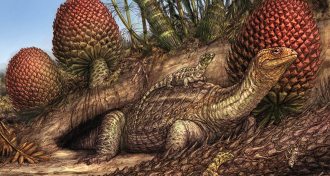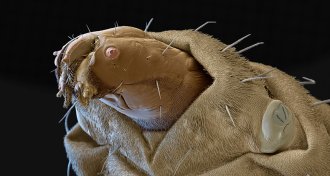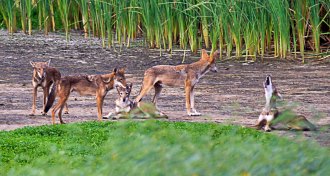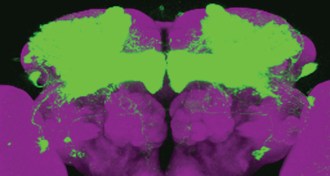Life
Sign up for our newsletter
We summarize the week's scientific breakthroughs every Thursday.
-
 Animals
AnimalsA rare, ancient case of bone cancer has been found in a turtle ancestor
A 240-million-year-old fossil reveals the oldest known case of bone cancer in an amniote, a group that includes mammals, birds and reptiles.
-
 Artificial Intelligence
Artificial IntelligenceReaders marvel at AI, space missions and wombat poop
Readers had comments and questions about defining artificial intelligence, the New Horizons space mission and more.
-
 Neuroscience
NeuroscienceBrain discoveries open doors to new treatments
Editor in Chief Nancy Shute discusses the history of neuroscience and new techniques scientists are using to influence the brain.
By Nancy Shute -
 Neuroscience
NeuroscienceBrain scans decode an elusive signature of consciousness
Newly described patterns of brain activity may help reveal the level of awareness in people with brain injuries.
-
 Genetics
GeneticsDNA reveals early mating between Asian herders and European farmers
A new genetic analysis could upend assumptions about the origins of Indo-European languages.
By Bruce Bower -
 Health & Medicine
Health & MedicineIn some cases, getting dengue may protect against Zika
A Zika outbreak in a Brazilian slum suggests that the timing of dengue infections may matter for protection against Zika.
-
 Life
LifeEvolutionarily, grandmas are good for grandkids — up to a point
Women may live past their reproductive years because they help their grandchildren survive, but there are limits to that benefit.
By Sujata Gupta -
 Plants
PlantsShutdown aside, Joshua trees live an odd life
Growing only in the U.S. Southwest, wild Joshua trees evolved a rare, fussy pollination scheme.
By Susan Milius -
 Genetics
GeneticsWhat FamilyTreeDNA sharing genetic data with police means for you
Law enforcement can now use one company’s private DNA database to investigate rapes and murders.
-
 Animals
AnimalsHow black soldier fly larvae can demolish a pizza so fast
When gorging together, fly larvae create a living fountain that whooshes slowpokes up and away.
By Susan Milius -
 Genetics
GeneticsDNA from extinct red wolves lives on in some mysterious Texas coyotes
Mystery canids on Texas’ Galveston Island carry red wolf DNA, thought to be extinct in the wild for 40 years.
-
 Genetics
GeneticsThis bacteria-fighting protein also induces sleep
A bacteria-fighting protein also lulls fruit flies to sleep, suggesting links between sleep and the immune system.